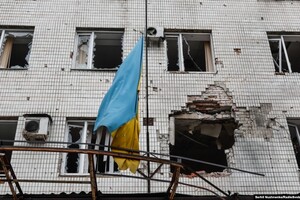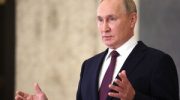The risks of easing pressure on the Kremlin to the crushing defeat of the Russian army are too high.

It seems that there is no end to the bloodshed in Ukraine. However, the wave of war began to unfold against the aggressor – Russia. May was to be the month during which Vladimir Putin's troops, having failed to attack Kyiv, would regroup in the south and east of Ukraine for a more powerful offensive in the western direction.
Most of May has already passed. However, it is already obvious that Russia's Plan B is also failing, the Washington Post writes in an editorial. Faced with fierce Ukrainian resistance, intensified by the timely and massive supply of Western weapons, Russia has retreated from Kharkiv in some areas, returning to the Russian side of the international border, which Putin wanted to erase. The Institute for War Studies (ISW) believes that Russia “most likely abandoned the goal of a large-scale encirclement of Ukrainian units” in eastern Ukraine. Now the aggressor is focused on trying to capture only one Ukrainian region – Luhansk region. However, even this task may be for the exhausted Russian troops, who are clumsily commanded.
The opposite is happening. It is more likely that the next turning point in this war will be an expanded counteroffensive of the Armed Forces, which will return the Russian-occupied parts of southern and eastern Ukraine back under the control of the legitimate government. Obviously, this result will be a strategic defeat for Putin, which Ukraine's supporters in the United States, Europe and other parts of the world must unanimously approach.
So now is not the time for a ceasefire between Ukraine and Russia, as France, Germany and Italy have been calling for in recent days. Their desire to reduce the devastating war and reduce the damage to both Ukraine and European economies is understandable. However, the risks of easing pressure on Putin before he is finally defeated are too high.
Read also: The war in Ukraine is not going as expected by Russia – Stoltenberg
This became clear on May 10 after a speech in Congress by US Director of National Intelligence Avril Gaines. She told US lawmakers that intelligence agencies “do not see opportunities for viable negotiations, at least in the short term.” The main reason for this conclusion is that Putin is pursuing a course of conquest despite all military losses.
“He is preparing for a protracted conflict, during which he still hopes to achieve goals outside Donbass,” Gaines said.
She added that instead of starting bona fide talks, Putin would rather choose an even bigger escalation. He can impose martial law in Russia, put industry on a “military track” or intensify hostilities. The last point is of particular concern, given Russia's nuclear and chemical capabilities. Gaines noted that Putin is likely to look forward to weakening US and EU resolve over global food issues, rising inflation and rising energy prices. The Washington Post believes that NATO leaders should not give Putin any reason to think that his strategy will work.
See the special topic: They have proven to the world the real “combat capability” of the Russians. Kalush Orchestra will go on a tour of Europe to raise funds to help Ukraine The funds will be donated to the needs of the army and charitable foundations of our country. Negotiations between Ukraine and Russia have been suspended Our country will not give anything away, including to save Putin's face. Russian troops launched an air strike on the Desna: eight people were killed 12 people were injured. “Azov” didn't just want to fight. We have always understood that war is imminent – the instructor of the Azov Regiment According to Kuparashvili, the authorities have not heard from the military for eight years.


